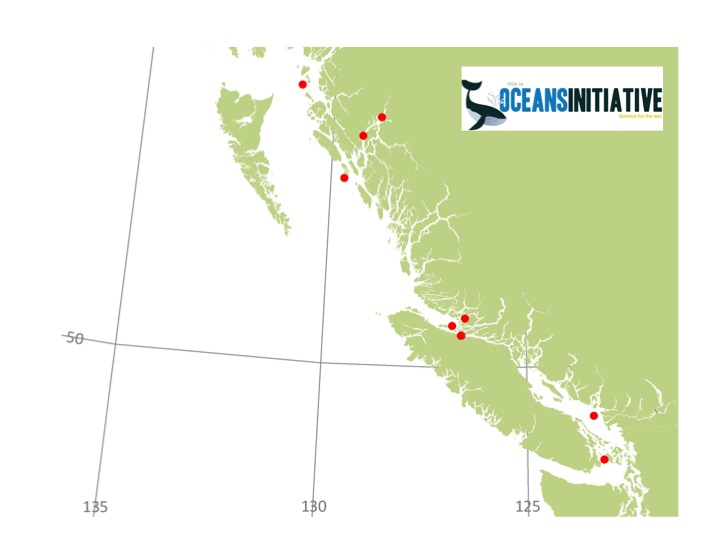
We are field biologists. We get excited about field work, not meetings. But we can’t tell you how excited we are to attend next week’s planning session for an International Quiet Ocean Experiment. {The fact that it’s in Paris, home of the best bakery in the world, may have something to do with it.} The IQOE is an international research effort coordinated by the team that led the wildly successful Census of Marine Life. The idea is to bring together the best and brightest to synthesize what we know about impacts of noise on marine organisms, experimentally remove human-generated noise in certain areas, and measure the response. The scale and complexity of the problem and the experiment are staggering. You can easily see how this exercise could take a decade.
Since 1995, Rob has been studying the effects of boat traffic and boat noise on the behaviour, activity budgets and energetics of killer whales. Since 2008, we have been immersed in our Quiet Ocean Campaign, which measures noise levels along the BC coast, modelling the impacts of that noise on whale populations, and proposing solutions to keep quiet areas quiet and make noisy areas quieter. This concern about human impacts on marine mammals is evident in our track record. Most of our publications deal with human impacts in one way or another. Last week’s near-miss, where a private boater came so close to L90 that many observers thought she’d been struck by a boat, reaffirms our belief that whales need sanctuaries, like the no-go zone we’ve been proposing to protect critical feeding habitats for southern resident killer whales. Our ocean noise study is maturing, and is poised to become a result-generating machine in the next year. You’ll be hearing a lot more scientific results from us in the coming year, especially about our proposals for acoustic sanctuaries, or Quiet Marine Protected Areas.
BUT SCIENCE ALONE DOES NOT SOLVE PROBLEMS LIKE RISING NOISE LEVELS IN THE OCEAN.
To change the way the world works will require tremendous cooperation and vision, because most people are simply unaware that the products they buy every day are shipped across ocean basins, and that the sum total of global shipping is a constant roar that drowns out the natural sounds of the ocean. So, there is something wonderfully idealistic and poetic about a global experiment to turn off the noise we make in the ocean, just for one day, to see and to hear how the sea responds. In that spirit, our post today is Pablo Neruda’s extraordinary, visionary poem, Keeping Quiet:
Now we will count to twelve
and we will all keep still.
For once on the face of the earth,
let’s not speak in any language;
let’s stop for a second,
and not move our arms so much.
It would be an exotic moment
without rush, without engines;
we would all be together
in a sudden strangeness.
Fishermen in the cold sea
would not harm whales
and the man gathering salt
would not look at his hurt hands.
Those who prepare green wars,
wars with gas, wars with fire,
victories with no survivors,
would put on clean clothes
and walk about with their brothers
in the shade, doing nothing.
What I want should not be confused
with total inactivity.
Life is what it is about…
If we were not so single-minded
about keeping our lives moving,
and for once could do nothing,
perhaps a huge silence
might interrupt this sadness
of never understanding ourselves
and of threatening ourselves with death.
Now I will count to twelve
and you keep quiet and I will go.
{Extravagaria : A Bilingual Edition
by Pablo Neruda (Author), Alastair Reid (Translator)
Noonday Press; Bilingual edition (January 2001) ISBN: 0374512388 page 26
(original Estravagario, Editorial Losada, Buenos Aires, 1958}

